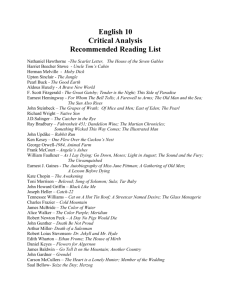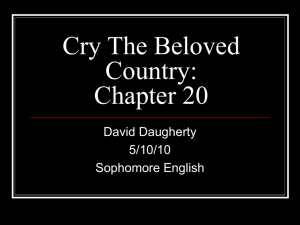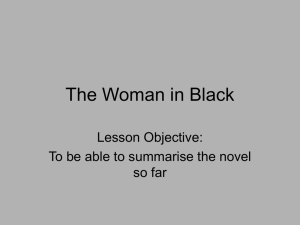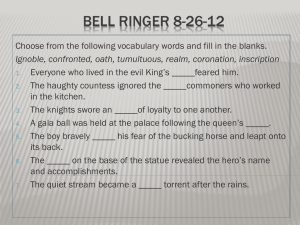Howard Brittney Howard Kathryn Schmidt Sociology 1160
advertisement
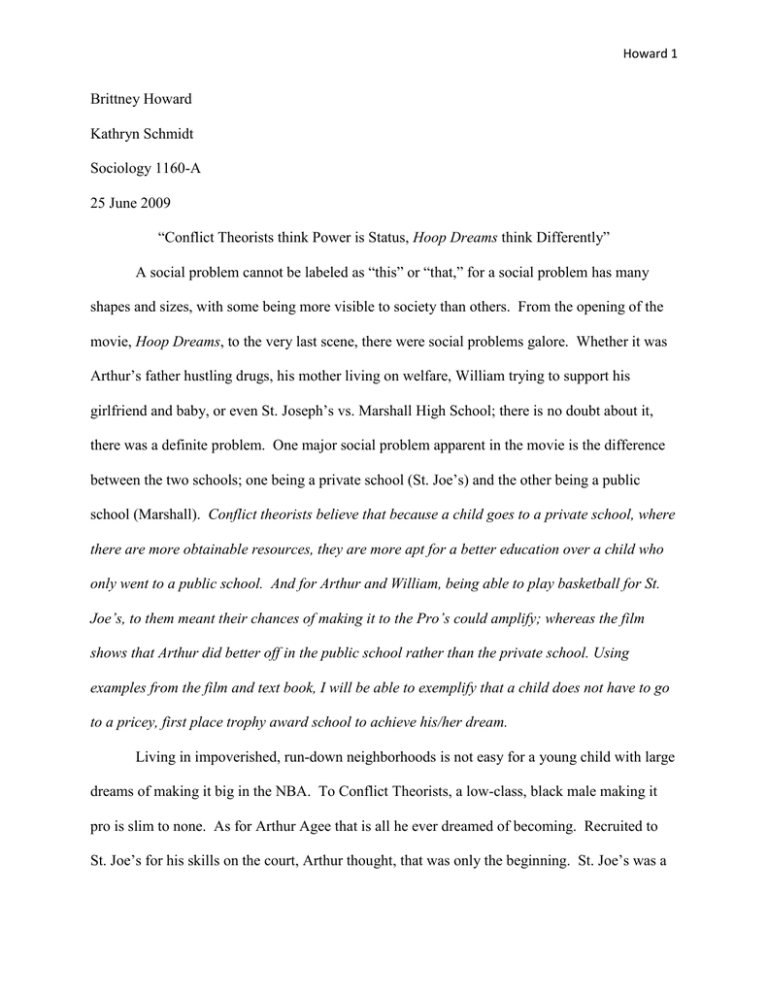
Howard 1 Brittney Howard Kathryn Schmidt Sociology 1160-A 25 June 2009 “Conflict Theorists think Power is Status, Hoop Dreams think Differently” A social problem cannot be labeled as “this” or “that,” for a social problem has many shapes and sizes, with some being more visible to society than others. From the opening of the movie, Hoop Dreams, to the very last scene, there were social problems galore. Whether it was Arthur’s father hustling drugs, his mother living on welfare, William trying to support his girlfriend and baby, or even St. Joseph’s vs. Marshall High School; there is no doubt about it, there was a definite problem. One major social problem apparent in the movie is the difference between the two schools; one being a private school (St. Joe’s) and the other being a public school (Marshall). Conflict theorists believe that because a child goes to a private school, where there are more obtainable resources, they are more apt for a better education over a child who only went to a public school. And for Arthur and William, being able to play basketball for St. Joe’s, to them meant their chances of making it to the Pro’s could amplify; whereas the film shows that Arthur did better off in the public school rather than the private school. Using examples from the film and text book, I will be able to exemplify that a child does not have to go to a pricey, first place trophy award school to achieve his/her dream. Living in impoverished, run-down neighborhoods is not easy for a young child with large dreams of making it big in the NBA. To Conflict Theorists, a low-class, black male making it pro is slim to none. As for Arthur Agee that is all he ever dreamed of becoming. Recruited to St. Joe’s for his skills on the court, Arthur thought, that was only the beginning. St. Joe’s was a Howard 2 definite culture shock for Arthur, quickly becoming a minority he found himself acculturating with his new peers. After his first year there, and his family not able to afford the tuition for St. Joe’s, Arthur was asked to leave. Feeling as if he would never make it pro, Arthur’s hopes began to dampen. Starting out as a sophomore at Marshall High School, Arthur found himself back into his “natural” settings. In addition to a crushed spirit, Arthur fell into a self-fulfilling prophecy about himself along with his academics. He was placed in classes that did not require much participation out of their students, and he did not feel the need or motivation to push himself to strive for greatness. On the other hand, William Gates, a companion of Arthur’s for a long time had a slightly different experience at St. Joe’s. William, like Arthur, lived on the less fortunate side of town and was enlisted at St. Joe’s for the same reasons as Arthur. But because “important” people saw potential in William, they offered him a free ride to St. Joe’s. William improved in his studies and made a mighty impression on the coach at St. Joe’s, so much so that he was placed on the varsity squad his freshman year. In the film there was a major difference between the two schools. St. Joe’s facility was well kept, with better teachers, enhanced technology, and had a greater school status; whereas at Marshall, as soon as a child walked through the main doors he/she must show their school I.D. card. Marshall had security guards patrolling the campus, fewer teachers, with not as many accessible resources to keep the children updated on the latest technology. Even the schools’ basketball teams had a difference is social status. St. Joe’s basketball team had a reputation for major winnings with players making it into great universities, whereas Marshall’s basketball team players were not a known to advance much after high school. Howard 3 Since Arthur’s family was of low-class standards, with his mother working for less than minimum wage and his father as a drug addict, Conflict Theorists could argue that, this was the reason for Arthur not being able to afford to remain in a well privileged school like St. Joe’s. Or could someone just call Arthur unlucky as compared to William, who was of the same background, but managed to miss a few loopholes on the way through the good fortune of having benefactors step in on his behalf? The movie shows that Arthur’s father was a repetitive drug addict; always using his family’s low income to buy the drugs and constantly being kicked out of the household. Had his father stopped this primary deviant behavior, Arthur could have had the opportunity to remain at St. Joe’s and could have achieved his dreams, even possibly becoming the next Isaiah Thomas. To Conflict Theorists, a society is made up of many different groups competing for the same thing: power and resources. And whoever has the most power with nearly all the accessible resources calls the shots. Only the wealthy and prestigious groups could afford a private school like St. Joe’s and obtain all the valuable resources and achieve a better academic status for themselves. As for Marshall, being a public school in the slums, with barely any wealth and no stature, could not possibly be an influential group to a Conflict Theorist. In the movie, the coach at St. Joe’s used the Labeling Theory when it came to watching how Arthur and William played basketball and went about their academic studies. Instead of giving Arthur a chance to really prove he had what it takes to be a great and successful basketball player, the coach wrote him off as a stubborn, immature student who was an average basketball player, but not as gifted or talented as William. And with that Arthur was asked to leave; which could have been another reason for Arthur feeling incompetent with regard to school. When the Howard 4 coach watched William perform, he labeled William as the next Isaiah Thomas. But later on, the coach realized what he had lost after watching Arthur at the State Final Four game. With the coach seeing the difference in the two boys four years later, he probably would have never imagined that Arthur would have come out on top. He managed to bring up his grades and graduate from high school and even send his basketball team all the way “down state.” And, as for William, he destroys his knee while beginning to lose focus and passion for the sport, and trying to support his girlfriend and newborn baby girl. Showing that a child really does not have to go to a top ranked school to have a great education and try and exceed in making his/her dreams come true. Howard 5 Works Cited Hoop Dreams. Dir. Steve James. Perf. Arthur Agee and William Gates. DVD. 1994. Mooney, Linda A., David Knox, and Caroline Schacht. Understanding Social Problems. Belmont: Wadsworth, 2008.


